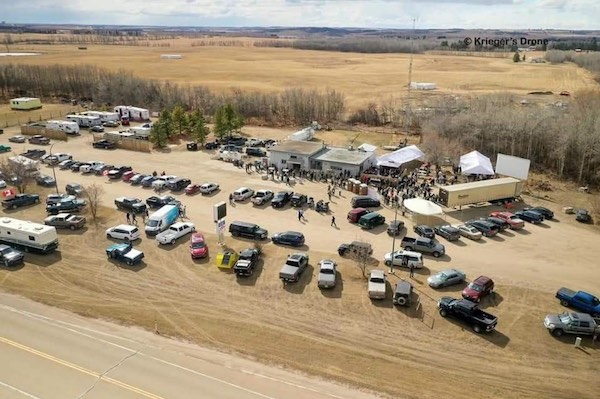Alberta
AHS changes the locks on the Whistle Stop Cafe

News release from Alberta Health Services
AHS statement on Whistle Stop Cafe closure
For several weeks, AHS has attempted to work collaboratively with the operator of the Whistle Stop Café to address the ongoing public health concerns at the site. Additionally, AHS has attempted to work with the property owner prior to taking such action.
Steps taken by AHS prior to physically closing the site include:
- A Closure Order was issued on January 22, 2021 requiring the Whistle Stop Café to comply with CMOH restrictions relating to dine-in services.
- A Court of Queen’s Bench Order was obtained on February 3, 2021 requiring the Whistle Stop Café to comply with the previous Closure Order, as well as CMOH orders.
- A Closure Order was issued on April 12, 2021 to comply with CMOH restrictions relating to dine-in services.
- A suspension of the operator’s food handling permit was implemented on April 12, 2021 for failure to comply with CMOH orders and the Public Health Act.
- A full Closure Order for the facility was issued on April 15, 2021, requiring the Whistle Stop Café to cease both dine-in and take-out services because of operating without a food handling permit, which is in contravention of Alberta’s provincial Food Regulation.
- The operator’s food handling permit was cancelled indefinitely on April 16, 2021 for failure to comply with the previous Closure Order.
These actions do not include any enforcement efforts undertaken by external partners, including the Alberta Gaming and Liquor Commission, Occupational Health and Safety and RCMP.
Every effort has been made to work collaboratively with the operator as well as the property owner to come to a resolution before progressing to further enforcement action. At this time the operator of the Whistle Stop Cafe has decided not to follow these mandatory restrictions, despite efforts by AHS and other partners, nor have they attempted to work to reduce the risk of COVID-19 transmission.
With COVID-19 cases increasing, including the more easily transmitted and potentially more severe variants, there is urgent need to minimize spread to protect all Albertans.
Since January 1, 2021 AHS has received 413 complaints from the public about the Whistle Stop Cafe. Public Health Inspectors have conducted multiple inspections at the site since and violations were observed at each visit. Alberta Health Services has been working closely with external agencies including Alberta Gaming and Liquor Commission as well as law enforcement partners on this file. Tickets, fines and criminal charges are under the jurisdiction of local law enforcement; AHS is unable to issue fines or tickets.
Alberta
Ottawa-Alberta agreement may produce oligopoly in the oilsands

From the Fraser Institute
By Jason Clemens and Elmira Aliakbari
The federal and Alberta governments recently jointly released the details of a memorandum of understanding (MOU), which lays the groundwork for potentially significant energy infrastructure including an oil pipeline from Alberta to the west coast that would provide access to Asia and other international markets. While an improvement on the status quo, the MOU’s ambiguity risks creating an oligopoly.
An oligopoly is basically a monopoly but with multiple firms instead of a single firm. It’s a market with limited competition where a few firms dominate the entire market, and it’s something economists and policymakers worry about because it results in higher prices, less innovation, lower investment and/or less quality. Indeed, the federal government has an entire agency charged with worrying about limits to competition.
There are a number of aspects of the MOU where it’s not sufficiently clear what Ottawa and Alberta are agreeing to, so it’s easy to envision a situation where a few large firms come to dominate the oilsands.
Consider the clear connection in the MOU between the development and progress of Pathways, which is a large-scale carbon capture project, and the development of a bitumen pipeline to the west coast. The MOU explicitly links increased production of both oil and gas (“while simultaneously reaching carbon neutrality”) with projects such as Pathways. Currently, Pathways involves five of Canada’s largest oilsands producers: Canadian Natural, Cenovus, ConocoPhillips Canada, Imperial and Suncor.
What’s not clear is whether only these firms, or perhaps companies linked with Pathways in the future, will have access to the new pipeline. Similarly, only the firms with access to the new west coast pipeline would have access to the new proposed deep-water port, allowing access to Asian markets and likely higher prices for exports. Ottawa went so far as to open the door to “appropriate adjustment(s)” to the oil tanker ban (C-48), which prevents oil tankers from docking at Canadian ports on the west coast.
One of the many challenges with an oligopoly is that it prevents new entrants and entrepreneurs from challenging the existing firms with new technologies, new approaches and new techniques. This entrepreneurial process, rooted in innovation, is at the core of our economic growth and progress over time. The MOU, though not designed to do this, could prevent such startups from challenging the existing big players because they could face a litany of restrictive anti-development regulations introduced during the Trudeau era that have not been reformed or changed since the new Carney government took office.
And this is not to criticize or blame the companies involved in Pathways. They’re acting in the interests of their customers, staff, investors and local communities by finding a way to expand their production and sales. The fault lies with governments that were not sufficiently clear in the MOU on issues such as access to the new pipeline.
And it’s also worth noting that all of this is predicated on an assumption that Alberta can achieve the many conditions included in the MOU, some of which are fairly difficult. Indeed, the nature of the MOU’s conditions has already led some to suggest that it’s window dressing for the federal government to avoid outright denying a west coast pipeline and instead shift the blame for failure to the Smith government.
Assuming Alberta can clear the MOU’s various hurdles and achieve the development of a west coast pipeline, it will certainly benefit the province and the country more broadly to diversify the export markets for one of our most important export products. However, the agreement is far from ideal and could impose much larger-than-needed costs on the economy if it leads to an oligopoly. At the very least we should be aware of these risks as we progress.

Elmira Aliakbari
Alberta
A Christmas wish list for health-care reform

From the Fraser Institute
By Nadeem Esmail and Mackenzie Moir
It’s an exciting time in Canadian health-care policy. But even the slew of new reforms in Alberta only go part of the way to using all the policy tools employed by high performing universal health-care systems.
For 2026, for the sake of Canadian patients, let’s hope Alberta stays the path on changes to how hospitals are paid and allowing some private purchases of health care, and that other provinces start to catch up.
While Alberta’s new reforms were welcome news this year, it’s clear Canada’s health-care system continued to struggle. Canadians were reminded by our annual comparison of health care systems that they pay for one of the developed world’s most expensive universal health-care systems, yet have some of the fewest physicians and hospital beds, while waiting in some of the longest queues.
And speaking of queues, wait times across Canada for non-emergency care reached the second-highest level ever measured at 28.6 weeks from general practitioner referral to actual treatment. That’s more than triple the wait of the early 1990s despite decades of government promises and spending commitments. Other work found that at least 23,746 patients died while waiting for care, and nearly 1.3 million Canadians left our overcrowded emergency rooms without being treated.
At least one province has shown a genuine willingness to do something about these problems.
The Smith government in Alberta announced early in the year that it would move towards paying hospitals per-patient treated as opposed to a fixed annual budget, a policy approach that Quebec has been working on for years. Albertans will also soon be able purchase, at least in a limited way, some diagnostic and surgical services for themselves, which is again already possible in Quebec. Alberta has also gone a step further by allowing physicians to work in both public and private settings.
While controversial in Canada, these approaches simply mirror what is being done in all of the developed world’s top-performing universal health-care systems. Australia, the Netherlands, Germany and Switzerland all pay their hospitals per patient treated, and allow patients the opportunity to purchase care privately if they wish. They all also have better and faster universally accessible health care than Canada’s provinces provide, while spending a little more (Switzerland) or less (Australia, Germany, the Netherlands) than we do.
While these reforms are clearly a step in the right direction, there’s more to be done.
Even if we include Alberta’s reforms, these countries still do some very important things differently.
Critically, all of these countries expect patients to pay a small amount for their universally accessible services. The reasoning is straightforward: we all spend our own money more carefully than we spend someone else’s, and patients will make more informed decisions about when and where it’s best to access the health-care system when they have to pay a little out of pocket.
The evidence around this policy is clear—with appropriate safeguards to protect the very ill and exemptions for lower-income and other vulnerable populations, the demand for outpatient healthcare services falls, reducing delays and freeing up resources for others.
Charging patients even small amounts for care would of course violate the Canada Health Act, but it would also emulate the approach of 100 per cent of the developed world’s top-performing health-care systems. In this case, violating outdated federal policy means better universal health care for Canadians.
These top-performing countries also see the private sector and innovative entrepreneurs as partners in delivering universal health care. A relationship that is far different from the limited individual contracts some provinces have with private clinics and surgical centres to provide care in Canada. In these other countries, even full-service hospitals are operated by private providers. Importantly, partnering with innovative private providers, even hospitals, to deliver universal health care does not violate the Canada Health Act.
So, while Alberta has made strides this past year moving towards the well-established higher performance policy approach followed elsewhere, the Smith government remains at least a couple steps short of truly adopting a more Australian or European approach for health care. And other provinces have yet to even get to where Alberta will soon be.
Let’s hope in 2026 that Alberta keeps moving towards a truly world class universal health-care experience for patients, and that the other provinces catch up.
-

 Bruce Dowbiggin1 day ago
Bruce Dowbiggin1 day agoHunting Poilievre Covers For Upcoming Demographic Collapse After Boomers
-

 Business1 day ago
Business1 day agoState of the Canadian Economy: Number of publicly listed companies in Canada down 32.7% since 2010
-

 Censorship Industrial Complex1 day ago
Censorship Industrial Complex1 day agoCanadian university censors free speech advocate who spoke out against Indigenous ‘mass grave’ hoax
-

 Alberta1 day ago
Alberta1 day agoHousing in Calgary and Edmonton remains expensive but more affordable than other cities
-

 Business2 days ago
Business2 days agoJudge Declares Mistrial in Landmark New York PRC Foreign-Agent Case
-

 Digital ID2 days ago
Digital ID2 days agoCanadian government launches trial version of digital ID for certain licenses, permits
-

 Business2 days ago
Business2 days agoThe “Disruptor-in-Chief” places Canada in the crosshairs
-

 International2 days ago
International2 days agoWorld-leading biochemist debunks evolutionary theory







